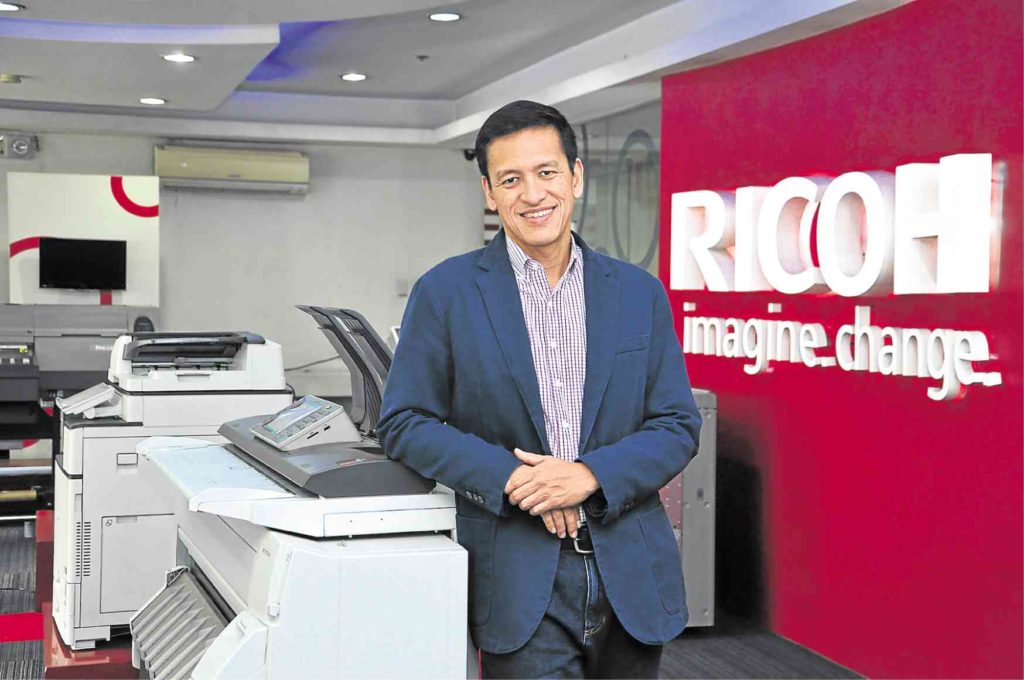Print, it’s alive!
Printing is still alive.
That may not be so apparent, given the ubiquity of e-mail and the steady shift to paperless communication at home and in the office.
But it still is.
According to Ricoh (Philippines) Inc., printing volumes in the country have not gone down. Helping prop up the growth are government offices and companies for whom paper use is still important for reasons such as record keeping and for evidence. The need for a paper trail is even more pronounced in the provinces.
That does not mean, however, that the global trends driving down printing volumes will exempt the Philippines.
Ricoh knows that it will only be a matter of time, thus it decided to lead the shift itself and not miss out on emerging opportunities around paperless communication.
At present, roughly half of Ricoh’s revenue comes from hardware sales—office, production printers, projectors, interactive white boards—and the other from services.
And as it continues to grow these traditional lines of business, it is also helping local companies transition to a paperless workflow and thus open up another source of revenue.
“All of the developed countries are starting to feel the decline in printing. We will come to that point eventually,” said Ricoh president and CEO Eric E. Sulit. “To be able to counteract that shift, we have to promote that shift ourselves, like through document management solutions.”
Document management is a broad concept that ranges from scanning and storing documents to a paperless workflow, where projects and even contracts can go through the approval process with no need for printouts.
“We are not yet there, where we route papers digitally and approve digitally. We are doing that internally. That is the big initiative within the company, to reduce the amount of paper that we are using, and in the process reinvent our business model,” he said.
Another bright spot for Ricoh is production printing, as companies and entrepreneurs are now shifting from using large offset printing machines to the more flexible digital production printers.
The difference of the cost per print between the offset machines and production printers used to be big, but the gap has been shrinking, said Sulit.
Thus for many companies, it makes more sense now to use the digital production printers for their needs, be it books, newsletters or marketing materials to promote their business.
“Also, the turnaround time using the production printer is much quicker. Many of the jobs can be done overnight,” he said.
This explains the changing composition of Ricoh’s sales.
Last year, the business in the Philippines was split between services and hardware. And of the hardware, production printers now account for 25 percent, with 75 percent taken up by the multifunction photocopiers and printers. The share of production printers was more than double from just 10 percent two years ago.
Ricoh Philippines, established in 1997, is also looking at new uses for printing, and that includes printing on materials other than paper, such as fabric. Printing technologies may also be applied to interior decoration and food packaging.
This pursuit of opportunities for printing technology is part of the long-term direction of the Japan-based Ricoh.
“The long term vision is to still print, but print on anything. Since paper is going to be reduced, we will need to print on other materials,” he said.
The future is stable, said Sulit, and that is great news for its 240-strong organization spread across offices in Metro Manila and branches in Laguna and Cebu.
“Right now we are heavily concentrated in Metro Manila. We also want to change that. We need to grow outside. There is still a lot of investment happening,” Sulit said. “We can still expand the customer base. The opportunity is there.”
And yes, even in an increasingly digital world.
“Printing is not dying but it is evolving. We are moving in the right direction. We have the right foundation for growth,” he added.

